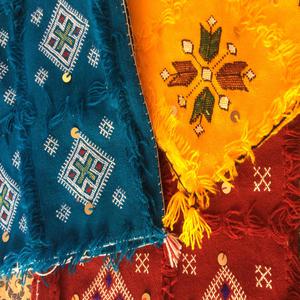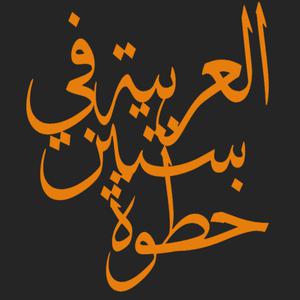
Arabic Qahwa (Arabic Literature)
Fluent Arabic
The Arabic Literature Podcast
- 28 minutes 29 secondsHow to take advantage of online learning
In this podcast episode, we discuss the incredible opportunities presented by online learning and how we can take advantage of them. Sheikh Muhammad Bailo, an experienced teacher at the Fluent Arabic institute, joins us.
20 November 2022, 3:20 pm - 24 minutes 30 secondsMethodology of Qur’an Memorisation in Africa
In this episode, we are joined by Sh. Ousmane Diallo and Sh. Mohammad Bailo to share their experience memorising and teaching the Qur’an al-Kareem. They also give some extremely valuable advice for those who want to memorise the Quran.
5 November 2022, 1:03 am - 17 minutes 45 secondsThe Poetry of Amr ibn Kulthum (Commentary)
The Mu’allaqah of the pre-Islamic poet Amr ibn Kulthum is one of the most stunningly beautiful poems in Arabic. In this episode we dive in deep, trying to understand the meanings and brilliance behind these Arabic lines.
11 September 2020, 5:05 pm - 10 minutes 26 secondsMajun Layla – the man who lost his mind for love
“I don’t ascend high mountains, except because of love
And I don’t sing poetry, except as medicine”
Listen to one of the most moving poems in Arabic literature, where Majnun Layla expresses his pain over losing his lover – Layla. And listen to what Layla had to say in reply to him.
28 August 2020, 5:24 pm - 8 minutes 35 secondsThe Poems of Imru’al-Qays
Imru’ al-Qays, was known as the wandering king, because he spent his life seeking revenge, and the re-establishment of his father’s lost kingdom. He is sometimes referred to as the father of Arabic poetry, because he established many of the conventions and themes in Arabic poetry – which the poets after him followed.
However, he wasn’t always concerned about power and vengeance. He spent his youth as a ‘playboy’, chasing women and drinking.
What made him special is his way with words. He puts his experiences, emotions and pain into his mesmerizing poetry.
23 August 2020, 3:28 am - 11 minutes 21 secondsThe Art of Praising Yourself
We take a look through the eyes of Arabic literature at the art of praising oneself. Some poets were shameless when it came to self-promotion. But is this a good idea? Are there lessons to be learned?
In this episode we will go through the poetry of Hatim at-Ta’iyy and Al-Mutanabbi said in Fakhr (self-exaltation)
11 August 2020, 3:31 pm - 9 minutes 27 secondsThe War of Basus
Listen to this Bizarre story from the pre-Islamic period where a war was fought for over 40 years between the tribes of Taghlib and Bakr over the killing of a camel. Listen to the stories of Kulayb, Jassas, Zir Salim, al-Harith ibn Ubad and more.
4 August 2020, 12:14 pm - 14 minutes 56 secondsThe Mu’allaqat – Hanging Odes – Part 2
An introduction to the Mu’allaqat or the Hanging odes. These are 7 poems that represent the finest of pre-Islamic Arabic poetry. The study of pre-Islamic poetry offers much insight into the language and the depth of its meanings and usages.
12 July 2020, 4:54 am - 29 minutes 29 secondsThe Mu’allaqat – Hanging Odes – Part 1
An introduction to the Mu’allaqat or the Hanging odes. These are 7 poems that represent the finest of pre-Islamic Arabic poetry. The study of pre-Islamic poetry offers much insight into the language and the depth of its meanings and usages.
This is part 1.
10 April 2020, 6:47 am - 23 minutes 9 secondsThe Poem of Ilbiri – On Leading a Purposeful Life – Part 2
Abu Isḥāq al-Ilbīrī al-Tujībī (d. 459 AH / 1067 CE) is said to have written this poem in response to a young man who had insulted him. Instead of replying in kind, which was the custom of poets, he decided to respond by providing the young man advice that would benefit him in this life and the next. This is part 2 of the explanation and commentary on this poem which will hopefully help you appreciate it even more insha’Allah.
Amazon US: https://www.amazon.com/dp/B084F57389
Amazon UK: https://www.amazon.co.uk/dp/B084F57389
Amazon DE: https://www.amazon.de/dp/B084F57389
Amazon CA: https://www.amazon.ca/dp/B084F57389
2 March 2020, 4:24 pm - 24 minutes 23 secondsThe Poem of Ilbiri – On Leading a Purposeful Life – Part 1Abu Isḥāq al-Ilbīrī al-Tujībī (d. 459 AH / 1067 CE) is said to have written this poem in response to a young man who had insulted him. Instead of replying in kind, which was the custom of poets, he decided to respond by providing the young man advice that would benefit him in this life and the next. This is part 1 of the explanation and commentary on this poem which will hopefully help you appreciate it even more insha'Allah. Amazon US: https://www.amazon.com/dp/B084F57389 Amazon UK: https://www.amazon.co.uk/dp/B084F57389 Amazon DE: https://www.amazon.de/dp/B084F57389 Amazon CA: https://www.amazon.ca/dp/B084F5738925 February 2020, 4:10 pm
- More Episodes? Get the App
Your feedback is valuable to us. Should you encounter any bugs, glitches, lack of functionality or other problems, please email us on [email protected] or join Moon.FM Telegram Group where you can talk directly to the dev team who are happy to answer any queries.
 Arabic Language & Culture
Arabic Language & Culture
 Arabic in 60 Steps Podcast
Arabic in 60 Steps Podcast
 Learn Arabic (Syrian) with LinguaBoost
Learn Arabic (Syrian) with LinguaBoost
 Real Arabic
Real Arabic
 Learn Arabic Pod تعلم العربية
Learn Arabic Pod تعلم العربية
 Talk In Arabic Podcast - All Dialects. Naturally Spoken.
Talk In Arabic Podcast - All Dialects. Naturally Spoken.